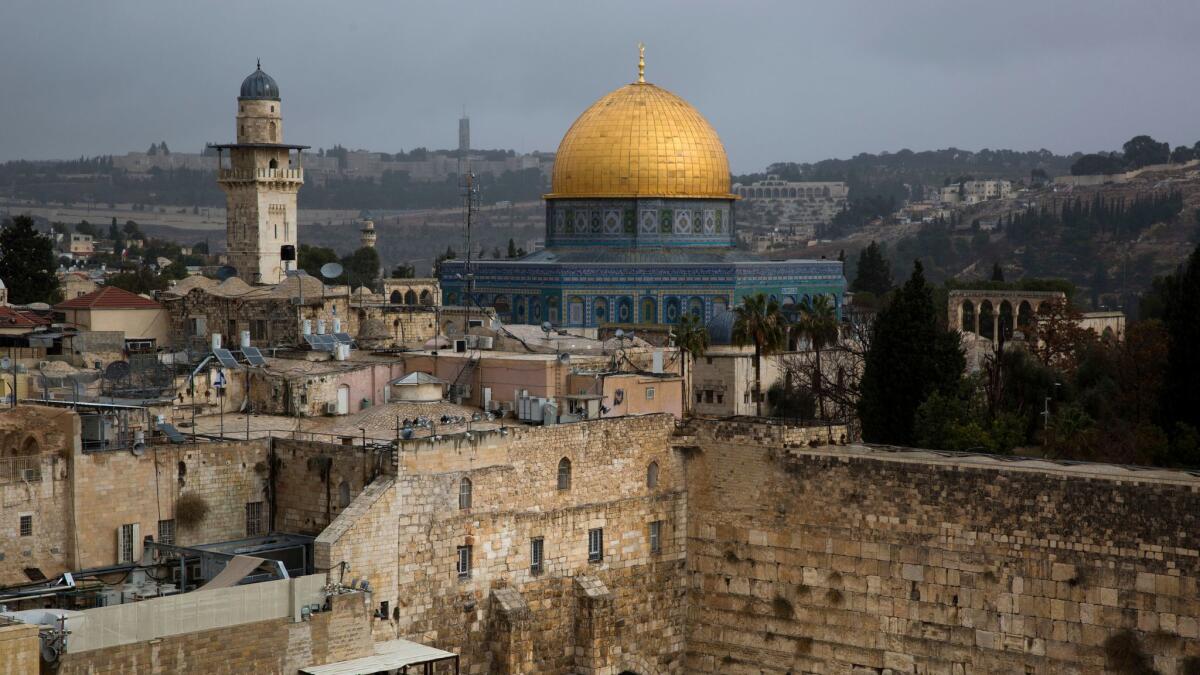Trump administration to open U.S. Embassy in Jerusalem in May. Palestinians criticize move as illegal and irresponsible

- Share via
Reporting from Washington — Accelerating controversial plans, the Trump administration will open a small U.S. Embassy in Jerusalem in May to coincide with the 70th anniversary of Israel’s declaration of independence, a State Department official said Friday.
Secretary of State Rex Tillerson approved preliminary security plans for a limited contingent, including the ambassador, David Friedman, and a skeleton staff, to move into a section of the American Consulate in the Arnona neighborhood of Jerusalem, said Steven Goldstein, the under-secretary for public diplomacy and public affairs.
For the record:
3:20 p.m. Feb. 26, 2018This article states that the U.S. Embassy has always been in Tel Aviv, “along with the rest of the world’s diplomatic missions.” However, a small number of countries had embassies in Jerusalem at various points in the past.
“The goal is to open a small footprint in May, and, over time, open a more full embassy by the end of 2019,” Goldstein said in an interview.
The May 14 date — the date Israel originally declared independence — significantly accelerates the schedule for transferring the U.S. Embassy from Tel Aviv, where it always existed along with the rest of the world’s diplomatic missions, to the disputed holy city of Jerusalem. (According to the Hebrew calendar, Independence Day this year will be celebrated on April 18.)
President Trump in December announced he was recognizing Jerusalem as the capital of Israel and ordering the embassy transfer, reversing decades of U.S. and international policy and enraging the Arab world and many allies.
While Israel claims Jerusalem as its “eternal and undivided” capital, Palestinians also claim the eastern part of the city as their capital in a future independent state.
The status of Jerusalem was to be decided in final peace talks. The Palestinians now contend that the U.S., once the broker of such talks, has disqualified itself as a mediator by taking Israel’s side.
The move has been celebrated in Israel, which has long had its ministries, parliament and government offices in Jerusalem. But it generated a wave of furious, weekly protests in Palestinian territories.
Vice President Mike Pence, visiting Jerusalem last month, gave the first sign that the embassy transfer was being accelerated, when he announced to the Israeli Knesset, or parliament, that the move would take place by the end of 2019.
U.S. officials say the 2019 deadline would see a substantial annex of the consulate in Jerusalem becoming the embassy. A new building to house a full embassy, however, will still take several years to establish, the officials said.
Israel Katz, the Israeli minister of intelligence, congratulated the Trump administration in a tweet Friday. “There is no greater gift than that!” he said. “The most just and correct move.”
Majdi Khaldi, diplomatic advisor to Palestinian Authority President Mahmoud Abbas, decried the “unfortunate announcement” that he described as “illegal, irresponsible and unacceptable to Palestinians.”
Trump’s move, Khaldi said in an interview, “gave the Israelis a pretext to say that Jerusalem is unified under Israeli rule,” contravenes international law and will impede peace efforts.
“It cancels any peace offer,” Khaldi said.
Trump, speaking at the White House on Friday alongside visiting Australian Prime Minister Malcolm Turnbull, reiterated a claim he has made that his administration is making “great progress” on promoting peace in the Middle East. Several former ambassadors to Israel say, in fact, peace has never been further away.
Jerusalem, a 6,000-year-old city, was divided for 19 years, from the date of Israel’s 1948 founding until the war of 1967, when Israel seized the eastern half of the city from Jordan.
The embassy move is scheduled to take place on the date marking Israel’s Declaration of Independence in 1948, which Palestinians call Naqba Day, or the day of the catastrophe.
State Department lawyers, meanwhile, were examining whether it is legal to accept private donations to fund a diplomatic mission, following a proposal by Las Vegas casino magnate and pro-Israel hawk Sheldon Adelson to pay for the new embassy.
Adelson is a major contributor to the Republican Party, a loyal supporter of Israeli Prime Minister Benjamin Netanyahu and owner of a popular tabloid in Israel. Trump’s Jerusalem decision was seen in part as a gesture to Adelson as well as to evangelical Christians, a key component of the president’s base of political support.
However, Goldstein said there were “no formal talks” between the State Department and any private citizen for financing the embassy, and no formal requests made to the State Department for such an arrangement.
Trump has promised the “ultimate deal,” a final agreement on Israeli-Palestinian peace, and placed the negotiations under the direction of his 37-year-old son-in-law, Jared Kushner.
None of the parties to possible future negotiations, however, has seen any part of the plan that the Trump administration periodically declares is imminent, and the Palestinian Authority cut off all contact with the United States following Trump’s Jerusalem announcement.
Daniel Shapiro, a former U.S. ambassador to Israel under President Obama, agrees that the embassy belongs in Jerusalem but that the Trump administration has failed to give the proper assurances especially to the Palestinians.
“Before May 14, the administration should do what it failed to do in December: describe this decision in the context of a broader, credible plan for two states, including a Palestinian capital in East Jerusalem,” Shapiro said.
Staff writer Wilkinson reported from Washington and special correspondent Tarnopolsky from Jerusalem.
UPDATES:
1:31 p.m.: This article was updated with staff reporting and comments from Steven Goldenstein and Majdi Khaldi.
This article was originally published at 8:25 a.m.
More to Read
Sign up for Essential California
The most important California stories and recommendations in your inbox every morning.
You may occasionally receive promotional content from the Los Angeles Times.










